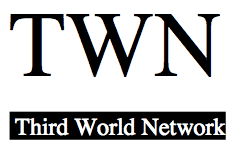 [Originally posted on twn.my, Link] There is little evidence to support WIPO’s approach of asserting intellectual property as a central piece of innovation, says Professor Carlos Correa, Senior Advisor at South Centre.
[Originally posted on twn.my, Link] There is little evidence to support WIPO’s approach of asserting intellectual property as a central piece of innovation, says Professor Carlos Correa, Senior Advisor at South Centre.
Prof. Correa, a renowned IP expert, was speaking at a side event on the “Future of WIPO’s Development Agenda”, organised by the South Centre, in conjunction with the meetings of the WIPO Assemblies (2-11 October) in Geneva.
During his opening speech at the Assembly, WIPO Director-General Dr Francis Gurry had underlined the importance of IP and innovation. He said: “ … innovation, … lies at the heart of the mission of intellectual property. Innovation has become a central element of the economic and industrial strategies of a wide spectrum of countries, not just the most advanced technologically, but also middle-income and other countries seeking to transform economies to a more sustainable basis of value addition. Its fundamental importance has been recognized in the Sustainable Development Goals (SDGs)”. Gurry also claimed that WIPO’s Global Innovation Index “established itself as the leading international reference for measuring innovation capacity and performance.”
Prof. Correa pointed out that the negative externalities of IP on development could be even located in the TRIPS Agreement. He cited Article 66.1 of the TRIPS Agreement, which allows least developed countries the option to not undertake obligations under the Agreement. It states: “In view of the special needs and requirements of least-developed country Members, their economic, financial and administrative constraints, and their need for flexibility to create a viable technological base, such Members shall not be required to apply the provisions of this Agreement”.
(Prof. Correa was a TRIPS Agreement negotiator on behalf of the government of Argentina when the treaty was being developed in the later 1980s, early 1990s.]
He proposed that there is a need to “Keep the room to use different sources of innovation.” Towards this purpose developing countries need to adapt IP to national and sectorial needs using the TRIPS flexibilities. He also listed the main sources of innovation: “Journals, patent documents, competitors (reverse engineering, technology diffusion), consultancy and engineering firms, R&D institutions, universities, users, competitors through licensing, New R&D”.
Prof. Correa also said that there are three stages of industrialization viz. initiation stage, internalization stage and generation stage. IP had little role in innovation during the first two stages of industrialization, during the three stages it affects the access to, and diffusion of, technologies and goods. IP protection could help local innovation strategies in the third stage, but it still affects a section of the population’s access to goods.
He recalled the joint proposal of Brazil and Argentina in 2004 which kick-started the process for the adoption of a development agenda. The proposal stated: “Development concerns should be fully incorporated into all WIPO activities. WIPO’s role, therefore, is not to be limited to the promotion of intellectual property protection”.
Prof. Correa cited various studies published over the years, which show that there is littlie evidence to support the formula “IP=Innovation=Development”. For example, one study as early as 2007 concluded that: “Indeed, the historical evidence provides little or no support for the view that intellectual monopoly is an effective method of increasing innovation.” (M. Boldrin and D. Levine: Against Intellectual Monopoly, 2007,http://levine.sscnet.ucla.edu/papers/ip.ch.8.m1 004.pdf).
The following year another study found that “ … nations with patent systems were not more innovative than nations without patents systems. Similarly, nations with longer patent terms were no more innovative than nations with shorter patent terms. (James Bessen and Michael Meurer, Patent Failure: How Judges, Bureaucrats, and Lawyers Put Innovators at Risk, Princeton University Express, Princeton and Oxford, 2008).
Fast forward to 2017 and a research team stated that, “We find evidence suggesting that increased levels of growth lead to greater levels of IP protection, contradictory evidence in the literature linking IP with growth, a lack of evidence that increased levels of IP protection lead to actual use of the IP system …We suggest that IP may have few direct effects on growth and that any causality is a result of belief rather than actual deployment of IP” (Richard Gold , Erica Shadeed and Jean-Frédéric Morin, ‘Does intellectual property lead to economic growth?: Insights from a novel IP dataset’, Regulation & Governance, 2017).
The authors went on to stress that, “Nowadays, it is widely recognised that the management of innovation in countries like the US has been sub-optimal and led to a situation that is increasingly litigious and plagued by conflicts. In fields such as information technology, a whole set of weak patents and an epidemic of over-patenting has made subsequent innovation difficult and has eroded some of the gains from knowledge … Moreover, in some areas, such as in pharmaceuticals, ever-stronger IP protections has not necessarily led to an increase in the discovery of new chemical entities … There is a shrinking of the knowledge commons as even publicly funded and promoted innovation is privatised, thereby reducing both equity and efficiency.”
This dissatisfaction with the current regime is magnified in the case of developing countries. Ever since the adoption of TRIPS, it has become increasingly clear that the IP provisions of the WTO are not well-aligned with the needs of developing countries and that they serve corporate interests in developed countries disproportionately. These conflicts become more pronounced over time. For example, in the case of extending patent protection to global pharmaceutical companies at the expense of the health of the poor, or extending copyright for books well past the time needed to compensate the author, thereby limiting access to books and educational materials in developing countries” (Dean Baker, Arjun Jayadev and Joseph Stiglitz, Innovation, Intellectual Property, and Development: A better Set of Approaches for the 21st Century, 2017, http://cepr.net/images/stories/reports/baker-jayadev-stiglitz-innovation-ip-development-2017-07.pdf).




